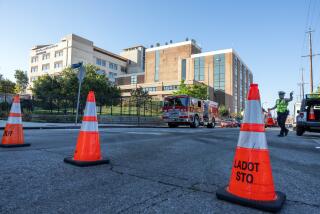Dallas hospital shifts blame to CDC on Ebola protocols
- Share via
Reporting from Dallas — Texas Health Presbyterian Hospital Dallas lashed back Thursday at nurses’ allegations that it had put workers at risk with shoddy protection policies and sloppy handling of waste while treating a Liberian man who died of the Ebola virus.
Two nurses subsequently were diagnosed with Ebola.
The hospital’s response -- its second in two days -- in part shifted responsibility to the federal Centers for Disease Control and Prevention and to the protocols the agency issued this summer to guide the handling of a patient infected by the virus, which is thought to have killed more than 4,400 people in West Africa. The hospital said the protocols changed frequently, frustrating caregivers and management.
The hospital also blasted “third parties who ... are seeking to exploit a national crisis.” That was a dig at the National Nurses United union, which does not represent the Dallas hospital’s nurses, but which made their complaints available to the media.
“Many of the comments we have seen or heard in the media are only loosely based on fact, but are often out of context and sensationalized,” the hospital statement said. “Others are completely inaccurate.”
Hours before the hospital’s statement, RN Briana Aguirre went public with allegations, first made anonymously Tuesday, of potentially hazardous missteps at Texas Health Presbyterian.
Aguirre recounted stories of medical waste piled high in hallways, and gaps in protective garb that could have exposed healthcare workers’ skin to the virus at a time when Duncan was vomiting and could not control his diarrhea.
Duncan initially came to the emergency room on Sept. 25 complaining of dizziness, a headache, nausea, stomach pains and a fever that spiked to 103. He told hospital workers he had recently been in Liberia, but was sent home with a prescription for antibiotics. He returned by ambulance on Sept. 28 in far worse condition, and died Oct. 8.
In televised interviews Thursday, Aguirre said she feared retaliation for speaking out about worker protection. An attorney accompanied her during the interviews.
“Texas Health Dallas has a strict non-retaliation policy,” the hospital statement said. “Employees are encouraged to raise issues and concerns via the chain of command.”
On Tuesday, the Oakland-based union read a statement it said was from the Dallas nurses, who were not identified, then relayed questions via telephone to the nurses, which they answered by emails read aloud by a union member.
The elaborate procedure was aimed at protecting nurses from identification, the union said. It did not say how many nurses were involved, nor did it describe their roles at the hospital.
Aguirre decided to break her silence with interviews that were aired by several news outlets, including CNN, through much of Thursday.
In response, the hospital statement said, “We have conducted interviews with well over 100 caregivers involved in Mr. Duncan’s care, some multiple times.” Those workers reported that they had been provided with protective garb in accordance with guidelines then set by the CDC, the statement said.
“The CDC guidelines changed frequently, and those changes were frustrating to [caregivers] and to management,” the hospital said. “Nonetheless, they endeavored to remain compliant with what was communicated as the most recent and appropriate guideline.”
CDC’s guidelines for Ebola protection, which are under review, leave the selection of gear to hospitals, “based on the nature of the patient interaction and/or the likely mode(s) of transmission.” But the protocols suggest “full coverage of the arms and body front, from neck to the mid-thigh or below will ensure that clothing and exposed upper body areas are protected.”
It likewise recommends masks and goggles, but warns: “Masks should not be confused with particulate respirators that are used to prevent inhalation of small particles that may contain infectious agents transmitted via the airborne route as described below.”
Nurses who spoke through the union said there were debates about whether masks and face protectors were necessary.
“Nurses had to interact with Mr. Duncan with whatever protective equipment was available at the time when he had copious amounts of diarrhea and vomiting, which produces a lot of contagious fluids,” the nurses charged Tuesday. “Hospital officials allowed nurses who interacted with Mr. Duncan to then continue normal patient care duties.”
The hospital responded that two CDC members at the facility recommended that the nurses improvise a way to cover the gaps in protective gowns by using medical tape.
The hospital said only nurses who were classified as having had “no known exposure” or “no risk,” as outlined in CDC standards, were allowed to treat other patients.
Waste was “contained in accordance with CDC standards,” and was “located in safe and containable locations,” the hospital said. “It is a gross exaggeration to say that trash was stacked up to the ceiling.”
The hospital also reiterated earlier apologies for its initial missed diagnosis of Duncan: “We have acknowledged that we made mistakes and that we are deeply sorry,” the statement said.
More to Read
Sign up for Essential California
The most important California stories and recommendations in your inbox every morning.
You may occasionally receive promotional content from the Los Angeles Times.














